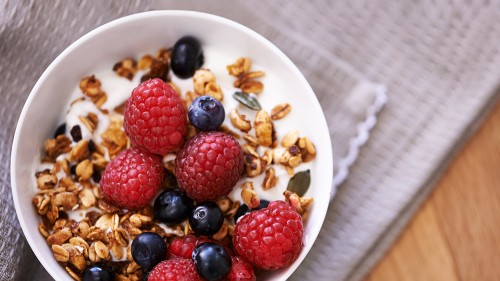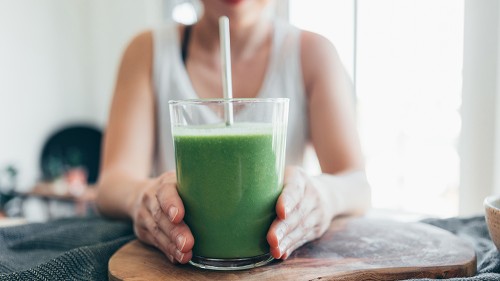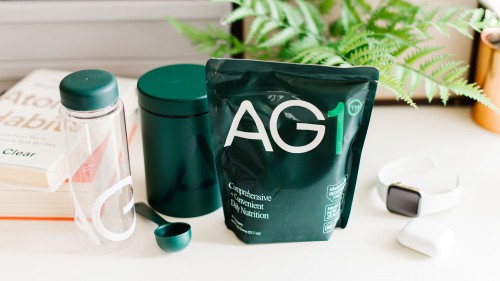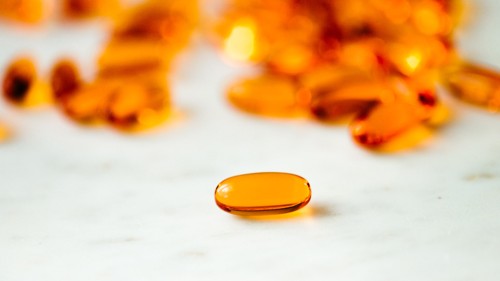A Dietitian Recommends Eating These 10 Foods When You’re Sick
Last Updated on December 6, 2021
Medically Reviewed by Anthony Dugarte, MD
Cold and flu season is around the corner, so it’s time to prepare yourself for a potential sick day. Here are the best foods to eat when you are sick to help you get over your illness.


If you are sick, I know that eating may not be the number one priority, and your appetite could be a little bit lower than usual while you’re sick.
Even if you’re not feeling up to full meals, it is still important to fuel your body to support your recovery. (1)
Everyone has their favorite sick-day foods that make them feel comfortable, and those are fine to eat. But, there are some great foods that contain specific nutrients to help you with your recovery.
If you’re looking for some ideas for what to eat that can help you get over your illness, here are 10 of the best foods to add to the menu:
1. Soup
If someone in your household is coming down with an illness, it’s a great opportunity to make soup for your family.
Chicken soup has been studied since the 1970s for its benefits during times of sickness.
One study found that chicken soup could have a mild anti-inflammatory effect for people experiencing upper respiratory tract infections. (2)
Both the chicken and vegetables present in the chicken soup had an anti-inflammatory response.
In a landmark study from 1978, chicken soup improved nasal mucus velocity, meaning that it had a nasal decongestant effect during upper respiratory tract infections. (3)
Even if you are not partial to chicken noodle soup, other soups will do the job.
The warm broth can help with decongestion, and the protein and vegetables from your soup will help reduce inflammation.
Put It Into Action:
- Make soup-making easy by finding a simple one-pot recipe, or find a hearty soup in the grocery store.
- You are not limited to chicken soup, so find a soup that best meets your personal preferences.
- When making soup, be sure to add some vegetables to the mix to get extra vitamins, minerals, and phytochemicals needed to help your immune system.
2. Pomegranate
Pomegranates are a sweet and tart fruit that you should consider adding to your si ck-day food list. This fruit is rich in polyphenols, vitamin C, folate, and fiber.
Research says that pomegranates could be helpful in fighting the flu.
One 2019 study found that pomegranate peel extract effectively inhibited the influenza A virus replication in cells. (4)
Another cell study found that the polyphenol content of pomegranate may be effective against other types of influenza-type viruses.
Pomegranate juice, concentrated liquid pomegranate extract, and a polyphenol powder extract of pomegranate were found to be effective against certain influenza strains like H1N1 and made them less infectious in minutes. (5)
Put It Into Action:
- Pomegranate arils (the seed pod) can be used as a topping for yogurt or salads.
- Pomegranate arils can be incorporated into many dishes, including roasted vegetables or your main protein.
- You can drink a glass of pomegranate juice daily.
- Pomegranate extracts are concentrated and can be found as a powder or drink.
3. Ginger
For as long as I can remember, putting on some vapor rub, drinking ginger ale, and laying down has been a perfect combo for making me feel better.
It turns out there are a lot of benefits to having ginger when you’re sick.
Fresh ginger could be effective against the human respiratory syncytial virus (RSV).
One 2012 study found that ginger can help prevent RSV from attaching to cells and entering the cells of the respiratory tract. (6)
The ginger helped activate anti-viral cytokines within the cells to block the activity of the virus.
Ginger is also effective for relieving stomach symptoms of illness due to gingerols and shogaols, phenolic compounds found in ginger that increase gastric emptying. (7)
A 2013 review on the gastroprotective effects of ginger notes that ginger can help treat ailments like constipation, bloating, indigestion, nausea and vomiting, belching, gastritis, and even gastric ulcers. (8)
Put It Into Action:
- The easiest way to incorporate fresh ginger into your diet is by making ginger tea. You can make ginger tea with simply some water and sliced ginger, and you can add lemon juice and honey for extra flavor and extra benefits.
- Ginger is delicious and found in many recipes, especially in Caribbean, Indian, and Asian cuisines.
- Ginger juices and ginger shots are available for a concentrated intake of ginger, but some of these may be a bit pricey.
4. Honey
Honey is a natural sweetener that has been used in medicine for thousands of years and may help you feel better when you’re sick.
According to clinical research, honey is anti-inflammatory, antimicrobial, and has antioxidant material. (9)
Honey has approximately 600 active compounds that contribute to its health effects, with flavonoids and polyphenols being the primary antioxidants in honey.
Different types of honey can modulate the immune response and increase the generation of various white blood cells during primary and secondary immune responses.
Put It Into Action:
- Though honey has many benefits, you only need to take honey in small doses. Add a spoonful of honey to warm tea to help soothe your throat.
- Honey can also be drizzled over foods like yogurt or fresh fruit.
5. Electrolyte Drinks
Between the symptoms of fever, vomiting, diarrhea, runny noses, and decreased appetite, it’s easy to become dehydrated when you’re sick.
Dehydration not only makes you feel thirsty, but it can reduce your strength, damage your kidneys, and make it difficult for your body to function properly.
Water is always a good standard for hydration, but sometimes you need additional electrolytes to compensate for increased losses from certain symptoms.
Coconut water is an excellent natural source of electrolytes.
While it may cause some people to feel a bit bloated and experience stomach upset, it is a good source of electrolytes and carbohydrates, making it an alternative to a sports drink. (10)
Put It Into Action
- When you’re looking for an electrolyte beverage to get rehydrated, don’t go for a high-sugar sports drink – having too much sugar when sick may worsen symptoms.
- Beverages like Pedialyte, coconut water, and electrolyte tabs that you add to water are good options.
6. Fatty Fish
Fish may not be the first thing on your mind to eat when you’re sick, but fatty fish has an abundance of nutrients that can help you recover.
Fatty fish is a good source of omega-3 fatty acids, vitamin D, B vitamins, protein, and even zinc.
A recent 2020 review suggests that all of these listed nutrients and more are important in supporting the immune system and reducing the burden of acute respiratory tract infections. (11)
Fatty fish can also be considered a functional food because fish contains peptides and amino acids shown by research to enhance the metabolism and function of cells in the immune system. (12)
Put It Into Action:
- When purchasing fish, look for fish high in omega-3 fatty acids like tuna, salmon, trout, mackerel, and sardines.
- Fatty fish can be prepared in many ways – pan-friend, oven-roasted, or even in an air-fryer.
- The Dietary Guidelines for Americans recommend having 4–8 oz of fish weekly.
7. Probiotic Foods
A healthy gut can help you recover from illness and reduce inflammation in the body. To support a healthy gut, eating probiotic-containing foods is the way to go.
Probiotics are live organisms that give health benefits when consumed in adequate amounts. They can be found in several fermented foods such as kombucha, yogurt, kimchi, and miso.
Results from a 2017 meta-analysis suggested that prebiotics and probiotics could help improve immunity and antibody response from influenza vaccines. (13)
Dysbiosis in the gut (an imbalance of bacteria) can contribute to systemic inflammation and impaired immunity.
Studies suggest that probiotics reinforce immunity and counteract inflammation, with certain strains effective against the proliferation of respiratory viruses. (14)
Put It Into Action:
- For breakfast, try having foods like yogurt or kefir. Even non-dairy versions of these products typically have beneficial bacteria added.
- Other fermented foods such as sauerkraut or kimchi are great toppings to add to noodles or other foods to get a probiotic boost.
- Fermented soy products, including tempeh and miso, are good sources of probiotics. You can make miso soup to get some extra hydration and mucus-clearing benefits.
8. Garlic
Garlic isn’t just a tasty vegetable and herb that might protect you against vampires — it can protect against illnesses as well!
Garlic contains organosulfur compounds such as allicin, which contributes to most of garlic’s therapeutic benefits. (15)
Studies show that garlic is anti-viral and prevents viruses from entering cells and replicating. Garlic also helps enhance our immune response, which in turn can reduce the spread of viruses. (16)
There’s not a lot of solid research on whether garlic can prevent or treat the common cold.
Still, one study found that garlic supplementation helped reduce the frequency of common cold occurrences and reduced the number of sick days. (17)
Put It Into Action:
- If you’re not afraid of a little bit of garlic breath, there are many ways to add garlic to your meals.
- Add sliced garlic to vegetables, meats, and soups, and broths.
- Make your own garlic bread with slices of real garlic on top.
- You can even roast a bulb of garlic and eat the cloves.
9. Tea
Tea is an excellent warm beverage to turn to when you’re sick. Like soup, tea can help with hydration and the warmth needed to break up mucus in your nasal cavity.
Drinking green tea or black tea may be extra beneficial to have while sick.
Tea from the Camellia sinensis plant (tea plant) contains catechins, phenolic compounds with strong antioxidant activity.
A 2018 review examined the effects of tea catechins on influenza and the common cold. (18)
Catechins such as epigallocatechin-3-gallate (also known as EGCG) and epicatechin-3-gallate (ECG) are shown to reduce the infectious activity of several viruses, including influenza A and B virus.
One study within the review noted that drinking tea may reduce cold and flu symptoms and reduce the number of days experiencing symptoms.
A more recent 2021 review found that drinking green tea or gargling with green tea may prevent influenza infection, though the exact dosing needed is inconsistent between studies. (19)
Put It Into Action:
- Start your morning off with a fresh cup of tea, potentially with some honey and lemon.
- When you’re sick, herbal teas may affect you differently – see how you feel with certain teas, and maybe stick with simple, classic teas until you get better.
- Keeping your tea in an insulated travel mug can help it stay warm for longer so that you don’t have to drink cold tea.
10. Bland Foods
Sometimes the best course of action to take when you’re sick is to eat the simplest foods.
You could be experiencing nausea, an upset stomach, or even a sore throat, and anything could set off at any moment.
Bland foods do not need to be completely devoid of flavor, but they should be relatively easy to eat, without intense flavors (such as very acidic, spicy, etc.), and be easy to swallow.
Examples of these foods may include oatmeal, applesauce, saltine crackers, popsicles, and bananas.
Put It Into Action:
- Make bland eating easy. Get things like squeeze-pouches for your applesauce, instant oatmeal, and foods you can eat with your spoon or with your hand.
- Alternate your bland foods with some nutrient-dense foods. Many bland foods can be low in protein, fiber, vitamins, and minerals, so you don’t want to risk not getting as much nutrition as possible.
The Bottom Line
What you eat can have a significant impact on the length and severity of your illness.
Choosing nutrient-dense foods is always a great choice when you’re sick because you’re supporting your immune system and giving your body the nutrients it needs.
Adding some of the foods and beverages on this list may help you feel better and alleviate some of the illness-related symptoms you have.
But don’t forget your special sick day meals as well — they can make you feel better whether or not they contain superfoods because they give you comfort.
If you are not improving after a few days, always speak to your doctor.
Protection against viruses starts well before you start feeling the first symptoms of an illness.
Keep your immune system strong by:
- Doing regular exercise
- Eating a diet full of whole foods
- Getting enough rest at night
- Managing your stress
At WellnessVerge, we only use reputable sources, including peer-reviewed medical journals and well-respected academic institutions.
- Energy intake and response to infection with influenza:
https://pubmed.ncbi.nlm.nih.gov/21548773/ - Chicken soup inhibits neutrophil chemotaxis in vitro:
https://pubmed.ncbi.nlm.nih.gov/11035691/ - Effects of drinking hot water, cold water, and chicken soup on nasal mucus velocity and nasal airflow resistance:
https://pubmed.ncbi.nlm.nih.gov/359266/ - Anti-Influenza Virus Activity and Phenolic Content of Pomegranate (Punica granatum L.) Peel Extract and Fractions:
https://pubmed.ncbi.nlm.nih.gov/31908736/ - Influenza virus variation in susceptibility to inactivation by pomegranate polyphenols is determined by envelope glycoproteins:
https://www.ncbi.nlm.nih.gov/pmc/articles/PMC7114265/ - Fresh ginger (Zingiber officinale) has anti-viral activity against human respiratory syncytial virus in human respiratory tract cell lines:
https://pubmed.ncbi.nlm.nih.gov/23123794/ - Gingerol and Its Role in Chronic Diseases:
https://pubmed.ncbi.nlm.nih.gov/27771925/ - A review of the gastroprotective effects of ginger (Zingiber officinale Roscoe):
https://pubmed.ncbi.nlm.nih.gov/23612703/ - Honey and Health: A Review of Recent Clinical Research:
https://www.ncbi.nlm.nih.gov/pmc/articles/PMC5424551/ - Comparison of coconut water and a carbohydrate-electrolyte sport drink on measures of hydration and physical performance in exercise-trained men:
https://pubmed.ncbi.nlm.nih.gov/22257640/ - Optimal Nutritional Status for a Well-Functioning Immune System Is an Important Factor to Protect against Viral Infections:
https://pubmed.ncbi.nlm.nih.gov/32340216/ - Antiviral Functional Foods and Exercise Lifestyle Prevention of Coronavirus:
https://pubmed.ncbi.nlm.nih.gov/32872374/ - Effect of Probiotics and Prebiotics on Immune Response to Influenza Vaccination in Adults: A Systematic Review and Meta-Analysis of Randomized Controlled Trials:
https://pubmed.ncbi.nlm.nih.gov/29077061/ - Probiotics in Treatment of Viral Respiratory Infections and Neuroinflammatory Disorders:
https://pubmed.ncbi.nlm.nih.gov/33105830/ - Garlic: a review of potential therapeutic effects:
https://www.ncbi.nlm.nih.gov/pmc/articles/PMC4103721/ - Antiviral potential of garlic ( Allium sativum) and its organosulfur compounds: A systematic update of pre-clinical and clinical data:
https://pubmed.ncbi.nlm.nih.gov/32836826/ - Garlic for the common cold:
https://pubmed.ncbi.nlm.nih.gov/25386977/ - Effect of Tea Catechins on Influenza Infection and the Common Cold with a Focus on Epidemiological/Clinical Studies:
https://www.ncbi.nlm.nih.gov/pmc/articles/PMC6100025/ - Anti-Influenza with Green Tea Catechins: A Systematic Review and Meta-Analysis:
https://pubmed.ncbi.nlm.nih.gov/34209247/





